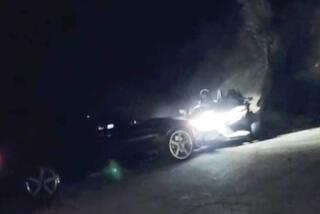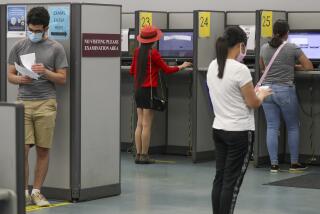‘Driving is like a sport, only . . . it’s a non-contact sport.’
- Share via
Chuck Woods, age 76, says he’s retired, but his answering machine delivers an admonition to callers that gives the first clue to how he really spends his leisure time: “If you must drink and drive, drink water.” Woods, after a 20-year career with the Los Angeles Police Department, is devoting his golden years to teaching other retirees to drive safely. With the help of his wife, Mary Lou, and partner Don Watkins--a 30-year California Highway Patrol veteran--he runs a company called “TranSafe” from his comfortable Oceanside home. Woods no longer actually teaches but works at drumming up publicity and helping start “mature driver improvement” schools throughout the state. In his study are two large maps of California, studded with colored tacks marking the locations of all the schools for traffic violators in the state that use their course materials, as well as all 56 of their recently established “mature driver” schools. He was interviewed at his home by Times staff writer Leslie Wolf and photographed by Barbara Martin.
When I retired and moved down here to San Diego County, I decided to build a house and do it myself. But I ran out of money part way through, so I had to get a job. I went to the safety council and found out they needed somebody to teach. For the next 12 years, I estimate that I ran about 25,000 people through the traffic violators’ school at MiraCosta College. That’s where my partner and I wrote the course for traffic violators’ school called “The Science of Navigation.”
Then on July 1 last year, a new law went into effect to establish a mature-driver improvement program, and we decided to write a course for that. The theme of the course is that driving is like a sport, only you’d better keep in mind one thing: It’s a non-contact sport. Once you make contact, you lose.
There are so many things that are comparable to sports: You have a field of play, you have lines, and there’s no going out of bounds. You’ve got the referee, who is a police officer, and you’ve got the coach, who is the instructor. We expect the instructor to have his personality show and be maybe a little bit of an entertainer. You’ve got to be a little bit of a ham to do this, but anything that is entertaining, like a joke, should advance the subject.
Most seniors played baseball when they were younger, and football, tennis and golf. But pretty soon they have to drop the more strenuous sports. The only two left are walking and driving. And it’s so important for them to be able to do this well. When a senior loses their license it’s like losing their right arm. So we tell them it will extend their driving years, and that is perhaps the key reason to take this course.
I taught the mature-driver course for two or three months to see how it worked and if it was all right. Now, we concentrate on starting other schools and coordinating their efforts. With 92 schools participating in our two courses, we feel it’s one of the strongest safety programs in California right now.
I enjoyed teaching the traffic violators’ school. People come in there and they’re angry because they got a ticket, so you’ve got to do something to get their attention. And if you don’t do it right away, some of them can give you a real problem.
One day my wife and I were shopping and a man came up to me and said: “Aren’t you the traffic school teacher? Well, you sure ruined my life!” Then he smiled, and we saw a woman standing a little way off. . . . She was his wife, and they were just looking at each other with angels in their eyes. It turns out they met in my class. He said when he got to the class he decided to make the best of things and sit next to the prettiest girl there. I’ve had two cases like that, where people met in class and got married.
Another good thing that happened in one of my classes was a young man who became inspired to learn something worthwhile and turn his life around. We had talked about driving responsibly, about policing your own actions to make sure you are the best possible driver you can be. . . . He later told me: “Hey, that’s a way of life you’re talking about!”
More to Read
Go beyond the scoreboard
Get the latest on L.A.'s teams in the daily Sports Report newsletter.
You may occasionally receive promotional content from the Los Angeles Times.










